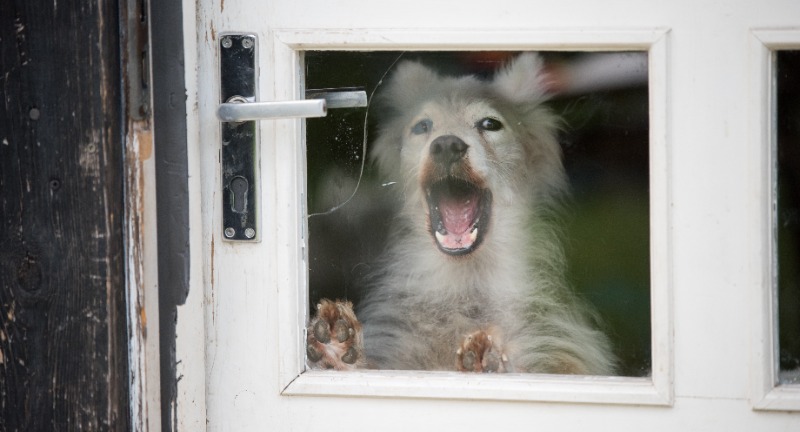
Shutterstock
Bringing a dog into your life is often seen as a heartwarming decision, but it’s one that comes with hidden complexities many don’t anticipate. The wagging tails and soulful eyes mask the realities of chewed up furniture, early morning wake ups, and a lifestyle overhaul you might not be prepared for. Beyond the adorable social media moments lies a world of commitment, patience, and unexpected expenses that can catch even the most enthusiastic dog lovers off guard.
Before you dive into pet parenthood, it’s crucial to ask yourself: are you ready for everything that comes with owning a dog? Understanding the often-overlooked aspects of dog ownership can save you heartbreak, frustration, and regret, and ensure a happy life for both you and your future furry companion.
Dogs Are a Lifelong Commitment

Shutterstock
Getting a dog means committing to its care for the entirety of its life, which can span 10 to 20 years. Many people don’t consider how their circumstances might change over such a long time—moves, new jobs, or growing families can all impact a dog’s stability. Unlike other responsibilities, you can’t simply “pause” or give up this commitment without deeply affecting the animal’s well-being. Before adopting a dog, think long-term and assess whether you can truly provide the consistent care it deserves.
Financial Responsibility

Shutterstock
Owning a dog comes with ongoing expenses that can quickly add up. Veterinary care, food, grooming, training, and supplies are just the beginning, while emergencies or chronic illnesses can bring unexpected costs. Many first-time dog owners don’t realize how much money it takes to ensure their pet stays happy and healthy. A realistic budget is essential before bringing a dog into your life.
Time and Attention Needed

Shutterstock
Dogs thrive on companionship and can suffer if left alone for long hours every day. They need daily walks, playtime, training sessions, and affection to stay happy and healthy. If your schedule is already packed, finding time for a dog can feel overwhelming and lead to behavioral problems in the pet. Consider whether you have the time to meet a dog’s emotional and physical needs before making the leap.
Behavioral Issues

Shutterstock
No dog is perfect, and many come with quirks that require patience and effort to manage. Chewing furniture, jumping on guests, or barking excessively are common issues that can arise without proper guidance. Behavioral challenges often stem from a lack of training or stimulation, making them preventable but not necessarily easy to fix. Prepare for the possibility of working with a trainer or investing time in learning how to address these behaviors effectively.
Training Needs

Shutterstock
Training a dog is not a one-time event but an ongoing process throughout its life. From basic commands like “sit” and “stay” to leash manners and socialization, training helps dogs understand how to navigate the human world. Many owners underestimate how much time and effort this requires, especially for stubborn or highly intelligent breeds. Without consistent training, dogs can become unmanageable and stressed, leading to a difficult relationship for both owner and pet.
Energy Levels Vary

Shutterstock
Every breed has different energy levels, and mismatching a dog’s activity needs with your lifestyle can lead to frustration on both sides. High-energy breeds like Border Collies or Huskies require vigorous daily exercise, while more relaxed breeds may be content with a short walk. Without proper outlets for their energy, dogs can become destructive or develop behavioral issues. Researching breed characteristics and honestly assessing your activity level is crucial before choosing a dog.
Breed-Specific Traits

Shutterstock
Dogs are bred for specific purposes, and these traits often shape their behavior and needs. A working breed like a German Shepherd might excel at training but require constant stimulation, while a hound might have a strong prey drive that complicates off-leash walks. Ignoring these traits can lead to frustration, as your dog’s natural instincts may clash with your expectations. Matching a breed’s temperament and requirements with your lifestyle ensures a harmonious relationship.
Shedding and Allergies

Shutterstock
Some breeds shed more than others, leaving hair on furniture, clothes, and floors. For allergy sufferers, this can make cohabitating with a dog uncomfortable or even impossible. Many prospective owners are unprepared for the constant cleaning or the reality of living with allergens. Understanding a breed’s grooming and shedding tendencies—and testing for allergies beforehand—can help you make an informed decision.
Regular Grooming

Shutterstock
Beyond brushing, some dogs need professional grooming that includes bathing, trimming, and nail clipping. Breeds like Poodles or Shih Tzus require frequent appointments, which can be costly and time-consuming. Neglecting grooming can lead to painful matting, skin issues, or overgrown nails that affect the dog’s mobility. Make sure you’re ready for the commitment, whether it’s DIY grooming or scheduling regular visits to a professional.
Impact on Travel Plans

Shutterstock
Owning a dog means your travel plans will always need to account for their care. Leaving them behind requires finding a reliable pet sitter, boarding facility, or friend who can help. Alternatively, taking them along on trips involves extra planning, including pet-friendly accommodations and transportation arrangements. Impulse trips and last-minute plans may no longer be as easy with a furry companion in your life.
Housing Restrictions

Shutterstock
Not all landlords or housing complexes allow dogs, and even pet-friendly spaces may have breed or size restrictions. Moving with a dog can be particularly challenging, as housing options become more limited. Additionally, securing a pet deposit or paying extra rent for your dog is often required. If you don’t own your home, consider how a dog might complicate your living situation.
Neighborhood Considerations

Shutterstock
Some neighborhoods are more dog-friendly than others, with ample parks, walking trails, and considerate neighbors. On the other hand, dense urban areas or places without green spaces can make daily walks stressful for both you and your pet. Noise sensitivity and interactions with other dogs or people also vary by neighborhood dynamics. Researching your local environment can prevent future frustrations for both you and your dog.
Socialization

Shutterstock
Dogs that aren’t properly socialized may struggle with fear, aggression, or over-excitement when encountering new people, pets, or environments. Early exposure to a variety of experiences is key to raising a confident and well-behaved dog. However, socialization requires effort and consistency, especially if the dog is naturally shy or has past traumas. Neglecting this can lead to a more isolated and stressful life for your pet.
Diet and Nutrition

Shutterstock
Not all dog food is created equal, and feeding your pet the wrong diet can lead to obesity, allergies, or other health problems. Dogs may have specific dietary needs based on their age, breed, or medical history, and some require prescription diets. High-quality food can be expensive but is often essential for long-term health. Learning about canine nutrition ensures you’re meeting your dog’s unique dietary requirements.
Seasonal Needs

Shutterstock
Extreme weather affects dogs differently based on their breed and coat type. Short-haired breeds may need extra warmth in winter, while thick-coated breeds might struggle in summer heat. Adjusting their environment and providing appropriate gear, like coats or cooling mats, can be an added expense. Understanding how your local climate impacts a dog’s well-being is an often-overlooked factor in pet ownership.
Impact on Daily Routine

Shutterstock
Dogs rely on consistency for feeding, walking, and playtime, which means your schedule must adapt. Busy workdays or spontaneous plans can disrupt their routine, leading to anxiety or behavioral problems. Balancing your needs with theirs requires careful time management and prioritization. If your current lifestyle is unpredictable, owning a dog might be more challenging than you anticipate.
Puppy Stage Challenges

Shutterstock
While adorable, puppies are essentially toddlers on four legs, requiring constant attention, training, and patience. House training can take months, and their boundless energy may test even the most prepared owners. Puppies also need to learn social skills and proper behavior during this critical stage. If you’re not ready for the intense effort, consider adopting an adult dog instead.
Noise and Barking

Shutterstock
Dogs communicate through barking, but excessive barking can quickly become a nuisance. It can disturb neighbors or signal underlying issues like boredom, anxiety, or lack of exercise. Training and understanding your dog’s triggers can help manage this behavior, but it takes time and effort. Be ready to invest in solutions to curb noise-related issues.
Commitment to Picking Up After Them

Shutterstock
Cleaning up after your dog isn’t glamorous but is a non-negotiable part of ownership. Neglecting this responsibility not only impacts your environment but can lead to community tensions or fines. Proper disposal of waste is essential, whether in your yard or during walks. Make sure you’re comfortable with this aspect before committing.
Potential for Aggression

Shutterstock
Aggression in dogs is often preventable but requires proactive training and socialization. Fear, resource guarding, or past trauma can trigger aggressive behaviors that need careful management. Ignoring early warning signs can make the problem worse, leading to safety concerns for you and others. Understanding the root cause and working with a professional is often necessary.
Emotional Investment

Shutterstock
Dogs offer unconditional love, but they also require significant emotional energy in return. Their happiness depends on your attention, patience, and ability to meet their needs, even during challenging times. Emotional bonds with dogs are incredibly rewarding but come with their own demands, especially during health crises or behavioral struggles. Make sure you’re prepared for the emotional highs and lows of pet ownership.
Conclusion

Shutterstock
Owning a dog is a life changing journey that requires thoughtful preparation and a willingness to embrace the challenges alongside the joys. By considering the often overlooked aspects of dog ownership, you can ensure a stronger bond with your furry friend and a happier, more fulfilling experience for both of you. Dogs give unconditional love, but they also demand patience, time, and responsibility in return. If you’re ready to meet those demands, the rewards of a loyal companion will be well worth the effort.























































